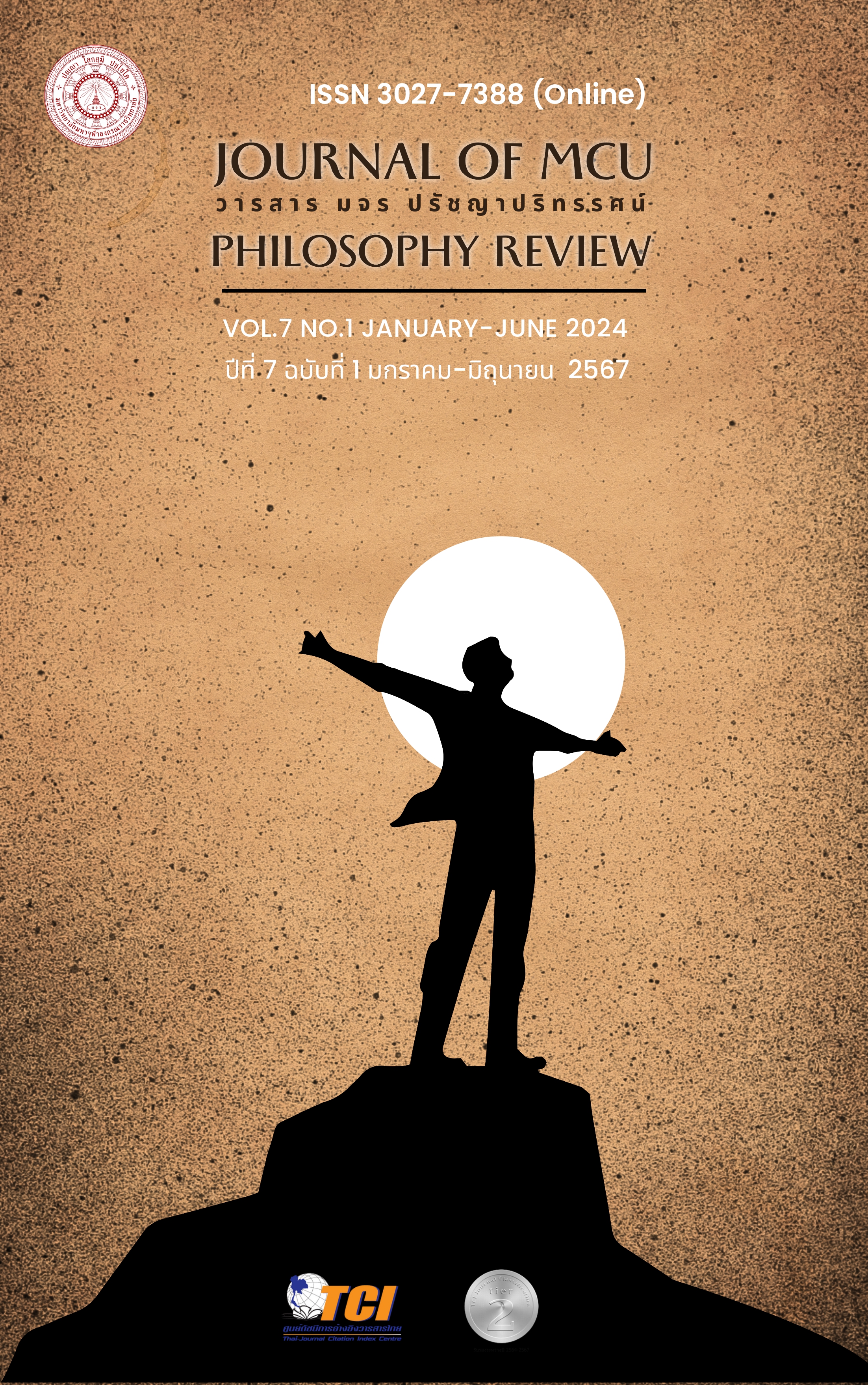Criteria to Judge the Existence of Ghosts in Theravada Buddhism
Main Article Content
Abstract
This article attempts to study the criteria for judging the existence of ghosts in Theravada Buddhism. By studying mainly from documents. The findings were found that Belief in “ghosts” is a traditional human belief that has existed for a long time and appears in various societies in every era. In Thai Buddhist society, there is the same belief in this matter as in another ethnic group. The beliefs about “ghosts” whilst we studied and analyzed as a whole, can be divided into 3 types: 1. High-class ghosts or good ghosts, including the category of “Gods/Deva” which can be divided into high-class gods and general gods 2. Middle class ghosts or ghosts that are evenly matched between good and bad (half good half evil), which can be divided into several groups, including ghosts of human-made, ghosts of the country and places of residence, ghosts of ancestors, etc. 3. Low-level ghosts or evil ghosts, which can be divided into evil ghosts that generally exist in nature and evil ghosts in hell, due to the "ghosts" are "power symbols" which emphasize "meaning" rather than "truth." Therefore, the beliefs and rituals of Thai Buddhists thus, coming to play a large role in society. By being involved in human life from birth until death and involves setting rules that affect social organization. This is because belief in the power of “ghosts” influences the behavior of individuals in society. When we studied and analyzed as a whole, it is enough to classify the social role of beliefs and rituals regarding the worship of "ghosts" into several characteristics. The roles that appear quite clearly include those related to the preservation of natural resources, and Occupational roles, including the role in cultivating of morale and encouragement, it is also the role in building individual empowerment and the role of gambling and divination.
Article Details

This work is licensed under a Creative Commons Attribution-NonCommercial-NoDerivatives 4.0 International License.
บทความที่ได้รับการตีพิมพ์เป็นลิขสิทธิ์ของวารสาร มจร ปรัชญาปริทรรศน์
ข้อความในบทความที่ได้รับการตีพิมพ์ในวารสาร ถือเป็นความรับผิดชอบของผู้เขียนบทความ และข้อคิดเห็นนั้นไม่ถือว่าเป็นทัศนะและความรับผิดชอบของกองบรรณาธิการวารสาร มจร ปรัชญาปริทรรศน์
References
จุฑาทิพย์ อุมะวิชนี. (2538). ชีวิตและการรู้จักตนเอง. กรุงเทพมหานคร: สำนักพิมพ์มหาวิทยาลัยธรรมศาสตร์.
ฉลาดชาย รมิตานนท์. (2543). ผี-เปรต: วาทกรรมแห่งอำนาจหรือความงมงาย. ไสยศาสตร์ครองเมือง. กรุงเทพมหานคร: โครงการวิถีทรรศน์.
ประคอง นิมมานเหมินทร์. (2542). “ผี”. สารานุกรมวัฒนธรรมภาคกลาง เล่ม 8. กรุงเทพมหานคร: มูลนิธิสารานุกรมวัฒนธรรมไทย ธนาคารไทยพาณิชย์.
พระธรรมปิฎก (ป.อ. ปยุตฺโต). (2544). เรื่องเหนือสามัญวิสัย : อิทธิปาฏิหาริย์เทวดา.กรุงเทพมหานคร: บริษัทสหธรรมิก จำกัด.
พระธรรมปิฎก (ป.อ. ปยุตฺโต). (2544). เรื่องเหนือสามัญวิสัย : อิทธิปาฏิหาริย์เทวดา. กรุงเทพมหานคร: สำนักพิมพ์ธรรมดา.
พระพรหมโมลี (วิลาศ ญาณวโร). (2535). ภูมิวิลาสินี. กรุงเทพมหานคร: มหาจุฬาบรรณาคาร.
พระยาธรรมปรีชา (แก้ว). (2520). ไตรภูมิโลกวินิจฉยกถา ฉบับที่ 2 (ไตรภูมิฉบับหลวง). กรุงเทพมหานคร: กรมศิลปากร.
พุทธินันทน์ บุญเรือง. (2555). การเปลี่ยนแปลงทางสังคมและวัฒนธรรมของประเพณีอัฐมีบูชาตำบลทุ่งยั้ง อำเภอลับแลจังหวัดอุตรดิตถ์. อุตรดิตถ์: มหาวิทยาลัยราชภัฏอุตรดิตถ์.
พรศักดิ์ พรหมแก้ว. (2544). ความเชื่อและพิธีกรรมที่เกี่ยวกับการนับถือผีกับบทบาทางสังคมของชาวไทยที่นับถือศาสนาพุทธในภาคไต้. สงขลา: มหาวิทยาลัยศรีนครินทรวิโรฒ.
ศรีศักร ว้ลลิโภดม. (2544). พัฒนาการทางสังคม-วัฒนธรรมไทย. กรุงเทพมหานคร: อมรินทร์.
เสรี พงษ์พิศ. (2535). “ผี”. คำ: ร่องรอยความคิด ความเชื่อไทย. ชุดความคิดและภูมิปัญญาไทย เล่ม 2. กรุงเทพมหานคร: จุฬาลงกรณ์มหาวิทยาลัย.
เสรี พงษ์พิศ. (2535). “ไสยศาสตร์”. คำ: ร่องรอยความคิด ความเชื่อไทย. ชุดความคิดและภูมิปัญญาไทย เล่ม 2. กรุงเทพมหานคร: จุฬาลงกรณ์มหาวิทยาลัย.
สมบูรณ์ สุขสำราญ. (2550). ความเชื่อทางศาสนาและพิธีกรรมของชุมชนชาวจีน. กรุงเทพมหานคร: ฝ่ายวิจัยจุฬาลงกรณ์มหาวิทยาลัย.
อานันท์ กาญจนพันธุ์. (2562). วิธีคิดเชิงซ้อนในการวิจัยชุมชน : พลวัตและศักยภาพของชุมชนในการพัฒนา. กรุงเทพมหานคร: สำนักงานกองทุนสนับสนุนการวิจัย (สกว.).


